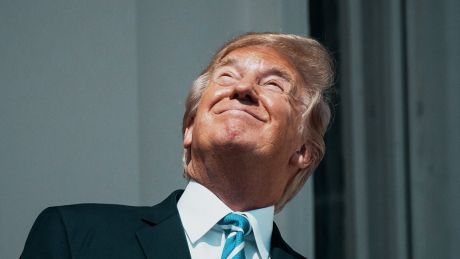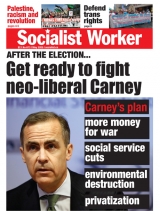Columns
You are here
The looming Trump Slump

August 25, 2019
In 2009 the late British Marxist Chris Harman published a book called Zombie Capitalism. When he began writing the book his purpose was to demonstrate how an understanding of Marx’s writings on the economy was essential to understanding capitalism and its workings.
And then, in the middle of writing the book, the credit crunch of August 2007 turned into the great crash of September-October 2008, leading one apologist for the system, Willem Buiter, to write of “the end of capitalism as we knew it."
Now in 2019, scarcely 10 years since what came to be known as The Great Recession, financial pundits are again predicting that the world is heading for recession.
The notion that crises can be regulated out of existence, which was the mantra of mainstream economists at the time, is clearly ridiculous.
In his book Harman described the lengths to which capitalists and governments would go to save their system: “Like the wild-eyed Dr. Frankenstein channelling electricity through his creation to give it life, our rulers have ploughed untold billions of dollars into the global economy to keep it afloat, leaving us with lumbering, unstable and dangerous ‘zombie capitalism’, threatening not only crises and war but the environmental destruction of the planet.”
Ten years down the road this description is even truer, if that’s possible. As the Amazon burns and the G7 meet in Biarritz, France to try and salvage their system amid looming trade wars and the buffoonery of US President Donald Trump, it’s clear that we cannot look to our leaders to save ourselves or the planet.
As host of the Group of Seven so-called most ‘developed’ nations (G7) (France, Germany, Italy, United Kingdom, USA, Canada and Japan), French President Emmanuel Macron told reporters that we are experiencing a “deep crisis of democracy” and urged his fellow leaders to reinvent multilateralism and rethink capitalism.
France’s finance minister Bruno Le Maire also boldly stated in a TV interview before the summit: “Capitalism is a dead end and must reinvent itself”.
But this is a sham and a joke. Months and months of demonstrations in France saw the ‘Gilets jaunes’ – thousands of ordinary French workers and students – saying similar things but actually meaning them, since they have been at the sharp end of Macron’s austerity measures.
They were repeatedly and viciously attacked by French riot police, under Macron’s orders.
The only reason France’s rulers are willing to talk about ‘reinventing’ capitalism is that they know their system is in trouble and they want to save a system which guarantees profits for the wealthy.
Trade War
The emergence of the ongoing trade war between the US and China is historically the way competing capitalist countries have tried to best each other in a weakening global economy.
In a recent tweet Trump said he was ordering US companies to look for ways to scrap their operations in China. “We don’t need China and, frankly, would be far better off without them,” tweeted Trump.
“Our great American companies are hereby ordered to immediately start looking for an alternative to China, including bringing your companies HOME and making your products in the USA.” Notwithstanding his God complex, the captains of industry chose to respectfully decline the President’s advice/order.
Unlike Trump, they know that the global nature of the world economy is not something that can be ‘willed’ out of existence; there is no such thing as individual capitalist countries opting out of the international financial system without dire consequences for the economies of those nations.
But the potential return of recession to the world system poses the question of why capitalism enters into these regular slumps, which have such devastating effects on ordinary people.
Trump slump
Michael Roberts, a British-based Marxist economist, who blogs regularly on the economy , describes the typical explanation of recession by main stream economists: The “Keynesian explanation is that there is a sudden loss of business confidence caused by some external factor like a trade war or a government falling or a war. There is nothing endogenously wrong with the capitalist process of production and investment for profit. The idea of ‘shocks’ to an inherently stable system is the mainstream macro view, in essence.”
But, as Roberts writes, this explains nothing, certainly not how one ‘shock’ to the system can precipitate a long-drawn out slump.
Following Marx’s description of the capitalist system Roberts argues: “… the theory and the evidence is there that capitalist accumulation and production moves forward in a succession of booms and slumps of varying magnitude and length according to movement of the profitability of capital culminating on a regular basis in a collapse of profits, taking down investment, employment, incomes and consumption in that order.”
Since the mid-1970s capitalism has been going through a long phase of crisis, in which booms are interspersed by deeper and deeper slumps.
Capitalists have not been motivated to invest all their profits on expanding production, because the rate of return they get on their investments has been low.
They cut workers’ wages to try to maintain their profits. This led to an increase in borrowing and debt. But the banks and financial institutions loaned more money than they would ever get back.
This sparked the “credit crunch” of 2007 and the 2008 melt-down.
But the only way the system got itself out of the last crisis was to inject billions of dollars into the economy (so-called Quantitative Easing) and to bail out the banks on the backs of ordinary people.
This has done nothing to deal with the underlying fundamentals of the system.
Figures released recently showed U.S. manufacturing growth slowing to the lowest level in 10 years. This undercuts one of Trump’s favorite talking points, that he saved manufacturing jobs that previous presidents could not.
In an interview with the Wall Street Journalrecently, Trump boasted that, thanks to him, the U.S. steel industry is now booming. Tell that to hundreds of workers in Michigan who were laid off recently by U.S. Steel, citing lower prices and soft demand amid Trump’s ongoing trade war with China.
At the time of the publication of Zombie Capitalisman interviewer asked Harman if our political leaders would be able to lead us successfully out of the 2008 crisis.
He answered in this way: “Our leaders haven’t solved the root of the crisis. If you take ibuprofen when you have influenza, your headache goes away for a few hours, but it will come back later.
“So, if the bosses do get out of this crisis, they will have created the preconditions for an even deeper crisis to come.”
As the world stares straight in the face of a new crisis we know that it will not affect us all in the same way. The ruling class and the rich will find a way to profit from the misery of ordinary people, as they have always done. Over the last 10 years ordinary workers and the poor have continued to lose ground, while the wealthy have seen their wealth increase exponentially.
We are also living in a world where even the survival of the planet seems a question. This has motivated thousands of young people and others to get involved in movements such as Extinction Rebellion or for a Green New Deal.
The energy of youth who are rebelling against a system based on profit for the tiny minority at the expense of social justice, economic justice and environmental justice for the majority of the world’s people needs to come together with the power of those who produce all society’s wealth – the working class – to overturn the destructive system of capitalism.
Section:
Topics:










